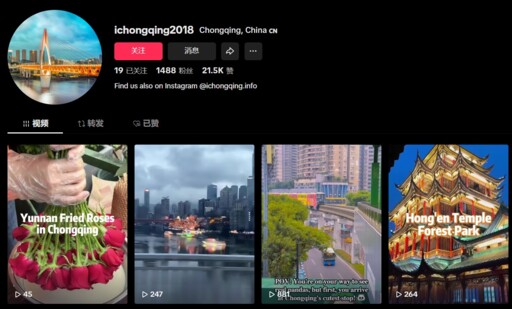


China can benefit from collaborative international communication

FILE PHOTO: TikTok account of iChongqing, a multi-media information platform operated by Western China International Communication Organization
In recent years, local Chinese media have actively engaged in international communication, tailoring their strategies to local cultural, historical, and natural resources. Drawing on field research conducted in Beijing, Sichuan, Chongqing, Hainan, and Hubei, this article explores how local media can establish a “collaborative communication” system through three key channels: media-university cooperation, domestic media cooperation, and transnational media collaboration.
Media-university cooperation
A shortage of highly skilled professionals poses a widespread challenge for local media in advancing international communication, severely limiting their content production capabilities. Addressing this requires fostering stable and effective cooperation between media outlets and universities via robust collaborative mechanisms.
Many Chinese universities offer “International Journalism” programs designed to cultivate interdisciplinary talent with expertise in both journalism and foreign languages. Universities can invite experienced editors and journalists as industry mentors while aligning their curricula with media organizations’ international communication needs. Students can gain hands-on experience through internships, and outstanding interns may secure employment opportunities with media outlets upon graduation.
In recent years, several Chinese universities have established think tanks and research institutions dedicated to international communication. Notable examples include the New Era International Communication Research Institute, jointly founded by Renmin University of China and China Media Group; the International Communication Big Data Intelligence Laboratory, co-established by Renmin University of China and China International Communications Group; as well as Tsinghua-Epstein Center for Global Media and Communication and the National Image Research Center, both based at Tsinghua University.
International students and foreign faculty at Chinese universities are both key audiences and potential content creators for international communication. They can serve as “global promotion ambassadors,” participating in the production of special reports and feature programs that present China’s history, culture, contemporary features, development achievements, and future aspirations from their unique perspectives.
Multi-level cooperation
Research shows that certain local media outlets lack adequate inter-organizational exchange in their international communication endeavors, hindering effective resource sharing. This issue could be addressed by the establishment of “Local Media International Communication Alliances” to pool resources and strengthen cooperation. For example, the Western China International Communication Organization in Chongqing Municipality is developing a “1+3+41” international communication network that includes 41 district- and county-level media convergence centers.
Currently, Sichuan, Chongqing, Hubei, and Hainan have demonstrated significant strengths and achievements in international communication. Provinces and cities that began these efforts more recently can strengthen cooperation with these leading regions. Local media should also actively collaborate with national media outlets, which play a dominant role in China’s international communication landscape due to their resource advantages and extensive practical experience.
For instance, in 2023, the Wuhan Media Group partnered with China Daily to establish the “Changjiang International Communication Center,” creating an international communication hub based in Wuhan and extending across the broader Yangtze River basin. In 2020, Changjiang Daily Press Group collaborated with Xinhua News Agency to launch the “Discover Wuhan” social media account network, which has since gained nearly 2 million followers on Facebook. Similarly, the municipality of Xi’an has worked with Xinhua News Agency to regularly host the “Workshops on Understanding Xi’an for International Friends,” which have become a platform for international cultural exchange and a “mobile reception room” for the city.
Transnational cooperation
Effectively telling China’s story necessitates cross-regional and transnational exchanges and collaboration. Local Chinese media can focus on partnering with three types of amicable overseas counterparts.
Overseas Chinese-language media: With a profound understanding of the sociocultural environment and audience preferences in their host countries, these outlets can assist with fostering a sense of affinity among overseas audiences when promoting traditional Chinese culture. For example, Beijing Radio and Television Station (BRTV) has collaborated with SinoVision, a New York-based Chinese-language TV network, purchasing airtime to broadcast its own programs which have built a stable regional viewership.
Mainstream media in sister cities: During the 2023 World Peony Conference held in Heze, Shandong Province, the Jornal de Colombo, a newspaper based in Colombo, Brazil—Heze’s sister city—dedicated an entire page to the event, facilitating cultural exchanges between the two cities.
Media from the Global South: In recent years, media from Global South countries have become increasingly prominent in the international public discourse. Local Chinese media should deepen people-to-people ties with these countries, encouraging mutual understanding and cooperation.
Successful transnational media cooperation requires carefully considering partners’ core concerns and establishing equal, mutually beneficial communication mechanisms and profit-sharing models. It is also important to enhance mutual understanding among people of different races and beliefs through emotional resonance, thereby improving reception among overseas audiences.
Zhao Yonghua is a professor from the School of Journalism and Communication at Renmin University of China. Zhou Jiaqi is a research fellow from the Research Center of Journalism and Social Development at Renmin University of China.
Editor:Yu Hui
Copyright©2023 CSSN All Rights Reserved